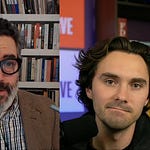You probably know Chris Hayes as the anchor of MSNBC’s All In with Chris Hayes, the news program he’s hosted for the last decade. The journalist, documentarian, and author has just published a new book, The Sirens’ Call: How Attention Became the World's Most Endangered Resource, which investigates how a defining quality of being human became the new oil and gas.
Hayes joined Anand to talk about all things attention: why we’re as attached to our phones as Gollum was to the One Ring, how the algorithms hijack the part of the brain meant to protect us from lions, and how we can begin to break free of the corporate interests — so contrary to our own — that compete for our emotions, every last second of our time, and every bit of our attention.
Below are some text excerpts of their conversation. Full the full conversation, in video and transcript form, click above, or, if you haven’t yet joined us, become a supporting subscriber of The Ink today.
The.Ink is brought to you by readers like you. Support independent media by becoming a paid subscriber today.
There's a scene early on that I want you to start with. We have daughters. You have three kids. I have two, but we have daughters roughly the same age. And there's a really touching, heartbreaking scene with your daughter when you're reading with her one morning, and you realize how broken both you and the world are. Can you just tell us that scene and story?
Yeah. It's just sitting next to her on the couch before school, and she wants me to read her book, and she's cuddled up to me, and her breath is on my cheek, and it's like the greatest feeling in the universe. And as I'm reading to her, I can feel an almost physical tug towards the phone sitting there in my pocket. I say it's pulsing there like Gollum's ring. And I don't look at it. The ability to reject it is important. It means I still have control over myself.
But why do I feel it in this moment that is the apex of joy? A moment that 30 years from now, I'll look back on and be like, "Oh, they went by too fast." And I think that feeling of interruption or that feeling of being pulled towards being outside ourselves in a moment of focus is so endemic to the times.
I start with the metaphor of Odysseus on the mast, avoiding the sirens. And ultimately, that epic is about his desire to get home, to get back to the woman he loves, and to get back to his family. And the journey is all the things trying to interrupt him and stop him from doing that. And what we want is to get home. What we want is to be with our family. What we want is to read to our children.
It feels like this world we've constructed for ourselves is interrupting and derailing that.
The reason I think it's such a powerful story is the moment with your daughter, our entire bodies and beings have been primed for thousands and thousands of years to respond to that moment, to savor that moment, to offer protection. That is the deepest training we have.
The deepest.
How is it that this thing — which is like 15 years old — we have not had enough time to evolve to it, but it is clearly tapping into some deep things in us? What is it about this thing that can even get in the conversation with the deepest instincts in your body? Like, how can that even be a competition?
Because it's also working on the deepest part of us. For a few reasons. One is we have this faculty for attention that we have evolved to save us from danger, right? So let's say you're with your child on the savanna, 100,000 years ago before humans have settled down into an agrarian society, and you're focused on them, and then there's a rustling in the bushes of something dangerous. It's that rustle, and your attention going to it before your conscious will. That's the source of all this because we have this faculty for involuntary attention.
If you loved your daughter too much in that moment, you would die.
Exactly. That's exactly right. So we have evolved. And it's an incredible faculty. I mean, it really is amazing. Like You could be locked in, locked into something. And if someone breaks a glass or someone fires a gun — and I've been in reporting situations where I'm locked in and someone fires a gun — your entire physiology moves towards the source of that.
That's as deep and as central to us as that moment of that feeling of care and love.
And in its origin, not toxic. In its origin, important.
Not toxic, yeah. And in its origin, not at all toxic. And in fact, attention is an incredible thing we have. Dogs have it too, but we have an amazing version of it, which is at any given moment, we're faced with infinite stimulus. I mean, it’s the only way to navigate the world,
If you're out and looking at a forest, if you equally paid attention to each leaf, you wouldn't be able to make sense of anything. It's the ability to focus, to withdraw attention from some things and put it on others, and then to have this compulsory sensation if things go sideways. And this fight between the kind of part of us that wants to direct our will to what we want to focus on — my daughter — and then the part that is always scanning in the background for some interruption, some danger, something we need to know about in the moment that is pre-conscious.
It's the war between those two things that we have that our current version of attention capitalism is exploiting, is sort of en masse and on-scale attempting to monetize.
What is it specifically about these new technologies that you focus on in the book that makes them able to trick your lion detector into action?
They're engineered to interrupt us and compel our attention, right? The best example of this — and I have notifications turned off — is the haptic feedback on your phone. That's happening as a physical sensation that bypasses your will. If you feel something buzz in your pocket, before you get to decide whether you want to notice or not, you're noticing it, right?
So they have engineered a bunch of ways to bypass conscious attention. And then — and this is really important, and one of the things I really try to wrestle with in the book — this is something that can be trained over time, can shrink or expand over time based on what we do with our minds, which is to say, the more accustomed we get to interruption, the more habituated we are towards finding diversion, the less comfortable we become sitting in the moment with her own thoughts or sitting there reading to your daughter or sitting doing anything.
And the more that you come to crave the interruption, the more that you come to crave the diversion. And that's also working on a deep part of us philosophically and spiritually.
One of the things you and I have talked about on this topic for a long time, even as you were working on this — and I wrote about this a little bit in my last book — was about this kind of asymmetry in American politics around attention and how the anti-democratic, increasingly fascistic modern right — particularly Trump, but not only — has really understood some of these dynamics of attention. And the left, the Democratic Party, pro-democracy movement, however you define it, it really does not.
You talked about this with Ezra Klein the other day, about how one way to think about it is understanding that it's the amplitude, the volume of total attention, the absolute value of attention, not the quality of attention.
When I talk about this people will say, “Well, no, it is inherently easier if you're malevolent, if you don't care about lying. It's not an even playing field. Of course it's easier for the Republicans, given their commitments.”
However, I don't necessarily agree with this. And I often find myself pushing back and saying, I don't know. I feel like you could generate as much attention around the scandal of healthcare bills as they're generating around the border.
You could generate as much attention about economic precarity as they're generating about crime in cities. So help me sort that out because I often feel like it's an excuse to just not be good at politics and not an inherent thing. But there's a lot of people who feel like it's just not the same game.
So that is a really well-formulated framework. I basically am going to split the baby here and say I sort of think there's something to each part.
On the first part, I do think that in the aggregate, an attentional system that selects for that compelled attention, the predators in the bushes in the aggregate, is going to have a reactionary effect in the same way that competitive evening news does, right? If it bleeds, it leads, local crime stories — they're doing that because that threat sensation is the thing that they're using to compel your attention. And I think in the aggregate, it calls forth from us the fight-or-flight part of us. And I think that's probably our most reactionary part.
So I really do think there's something to that. I do think it's easier to get attention on an invasion at the border than healthcare bills. I do. I think there's something deep in the wiring about that.
Can you talk about the effort to update Marx and his notion of alienation, both in the wage labor story of the 19th century and the attention story of today?
Yeah. So I'll start with Marx's basic story about wage labor, which is, look, human toil, human effort, us doing stuff, that long predates labor as a category. It long predates a system of wages where you're paid for that work. And his point is that the transformation of capitalism takes this thing that's inside us, the product of our effort and will, and commodifies it, puts it on a market exchange, and extracts it from us. And it going from something internal to us to something external to us produces alienation. The source of alienation is the feeling of a thing that should be internal to us being outside of us, of us being estranged from it.
I think something's happening along the same lines with attention. This thing is internal to us. We want to control where it goes, which is really the substance of our lives. The sum totality of our consciousness is where I put my thoughts at a given moment. And now a system exists of very sophisticated corporations and multi-billion dollar companies, some of the largest and most powerful in the world, whose CEOs are arrayed with the President of the United States at his inauguration, where their business model is to take that attention from us and sell it. And the thing that was internal to us is now being extracted at a market price.
But why is an invasion at the border different from a wildfire and climate change?
The wildfire, actually, I do think is an example where it is easy to get attention in the same way because it has the same threat. So that, I think, is an example that lines up in the same place as the border. And we've seen that. I mean, it's not like there hasn't been a lot of coverage of the wildfire. Now, what you do with that and whether you connect to climate change is the question, which I think connects to the second thing, which is I also agree with you that Democrats have been conflict-averse and conflict draws attention, and have also not understood how important it is to get attention, even if you run the downside risk.
And the one person who gets it is someone who figures prominently in your last book, who you profile, is AOC, who is the best at this of Democrats. Whatever you think about her, whether you agree or disagree with her politics, as an attention age politician, she is by far the most gifted.
It's easier to troll than to get attention for positive ends. The reason trolling exists is because if you're okay with getting negative attention, it is easier to get negative attention than positive attention. If you want to just start screaming at people on a subway, you can make them all look at you. But if you want to persuade everyone =in the subway to listen to what you have to say or to give $5 to a charity, it's harder. It just is.
What AOC has figured out is how to do both. And I think even where she fails or if she's polarizing, she is operating in the world of this reality in a way that very few Democratic politicians are.
I often think about political emotions underneath political events. And I think a very broad political emotion right now across the spectrum is the sense of being kind of defenseless, undefended, not spoken for or advocated for by people with more power than you.
It's not that people want to watch you for three hours. But I think there's a way in which that answers that sense of undefendedness. You're just walking with people.
All this is Politics 101. But you know FDR.'s Fireside Chats, the reason those are so iconic is because of the way they synced up with a new medium, which was the radio. And it's a sort of example of the frontier of using the radio for politics. But it’s also because he was just doing a ton of public communicating, all the time.
And look at Trump. I mean, Trump's done more talking than most Democratic politicians do, not just Biden. I mean, Barack Obama talked a lot, but they were staged events, and Trump's just like constantly yammering. And a lot of what he says is just like vile nonsense. But again, you're hearing from him.
The above are excerpts from our conversation with Chris Hayes. To watch the full video, to get access to a complete transcript of this discussion, and to read and comment on this and all of our posts, sign up as a paid subscriber. We’d love it if you’d join us today.
Chris Hayes’s latest book is The Sirens’ Call: How Attention Became the World's Most Endangered Resource.














